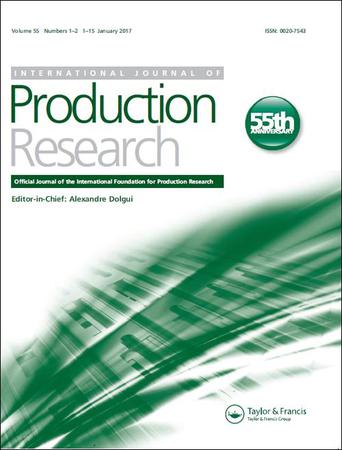流水车间群调度问题的综合文献综述:系统和文献计量学综述
IF 7
2区 工程技术
Q1 ENGINEERING, INDUSTRIAL
International Journal of Production Research
Pub Date : 2023-10-05
DOI:10.1080/00207543.2023.2263577
引用次数: 1
摘要
摘要本文综述了制造环境下的流水车间群调度问题。本文的目的有两个:(1)对制造系统中流水车间群调度问题的研究进行了全面的综述;(2)进行了文献计量分析。我们讨论了流水车间组调度问题的一般定义,并提供了以前文献中使用的方法分类。这些论文从几个角度提出,包括使用的目标函数,问题结构的转换,现有文献的基准和解决方法。此外,对1986年至2022年间发表的文章进行了文献计量分析,包括关键词和期刊分析。最后,对未来的发展提出了建议,以进一步巩固这一领域。关键词:流水车间群调度问题文献计量分析系统分析细胞制造vosviewer披露声明作者未报告潜在的利益冲突。数据可用性声明数据共享不适用于本文,因为本研究没有创建或分析新的数据。snilg本文章由计算机程序翻译,如有差异,请以英文原文为准。
A comprehensive literature review of the flowshop group scheduling problems: systematic and bibliometric reviews
AbstractThis paper deals with an overview of flowshop group scheduling problems in the manufacturing environment. The aim of this paper is twofold: (i) making a comprehensive survey of research on flowshop group scheduling problems in manufacturing systems, and (ii) presenting a bibliometric analysis. We address the general definition of flowshop group scheduling problems and provide a taxonomy of methodologies used in previous literature. The papers are presented from several perspectives, including the utilised objective functions, a transformation of problem structure, benchmarks in existing literature, and solution approaches. Additionally, bibliometric analysis, including keyword and journal analyses, is conducted for articles published between 1986 and 2022. Finally, suggestions for future developments are listed to further consolidate this area.Keywords: Flowshop group scheduling problembibliometric analysissystematic analysiscellular manufacturingVOSviewer Disclosure statementNo potential conflict of interest was reported by the author(s).Data Availability StatementData sharing is not applicable to this article as no new data were created or analysed in this study.Additional informationNotes on contributorsNilgün İnceNilgün İnce is a Ph.D. candidate at Department of Industrial Engineering, Sakarya University, Turkey. She obtained BS degree in industrial engineering from Kütahya Dumlupınar University and MS degree in manufacturing systems engineering and management from University of Warwick (WMG) in 2018. She is funded by Republic of Turkey Ministry of National Education during master studies and participated projects in automotive manufacturing in UK. Her research interests include optimisation, hyper-heuristics and scheduling. She currently works as a lecturer at Alanya Alaaddin Keykubat University.Derya DeliktaşDerya Deliktaş is an associate professor at Department of Industrial Engineering in Faculty of Engineering, Kütahya Dumlupınar University, Turkey. She received the B.S. degree in industrial engineering and Ph.D. degree in industrial engineering from Erciyes University and Sakarya University, respectively. She did her post-doctoral research as a researcher supported by Scientific and Technological Research Council of Turkey (TÜBİTAK) in Computer Science and Operational Research with the Computational Optimisation and Learning (COL) Lab in the School of Computer Science at the University of Nottingham (UoN) in UK. Her research interests and activities are scheduling problems, assembly line balancing problems, portfolio optimisation, artificial intelligence methods, multi-criteria decision making methods, and data mining.İhsan Hakan Selviİhsan Hakan Selvi is an associate professor in Information Systems Engineering Department at Sakarya University, Turkey. He received the B.S. and Ph.D.degrees in industrial engineering from Sakarya University. He has been at Missouri Science and Technology University as a guest researcher. He works as a project executive in manufacturing projects supported by Scientific and Technological Research Council of Turkey (TÜBİTAK). His research interests are smart manufacturing and service systems, information systems, deep learning, scheduling and optimisation. He is on the editorial board of Sakarya University Journal of Science and Artificial Intelligence Theory and Applications. He has several management roles at Sakarya University and currently works as an assistant director of Institute of Natural Sciences.
求助全文
通过发布文献求助,成功后即可免费获取论文全文。
去求助
来源期刊

International Journal of Production Research
管理科学-工程:工业
CiteScore
19.20
自引率
14.10%
发文量
318
审稿时长
6.3 months
期刊介绍:
The International Journal of Production Research (IJPR), published since 1961, is a well-established, highly successful and leading journal reporting manufacturing, production and operations management research.
IJPR is published 24 times a year and includes papers on innovation management, design of products, manufacturing processes, production and logistics systems. Production economics, the essential behaviour of production resources and systems as well as the complex decision problems that arise in design, management and control of production and logistics systems are considered.
IJPR is a journal for researchers and professors in mechanical engineering, industrial and systems engineering, operations research and management science, and business. It is also an informative reference for industrial managers looking to improve the efficiency and effectiveness of their production systems.
 求助内容:
求助内容: 应助结果提醒方式:
应助结果提醒方式:


